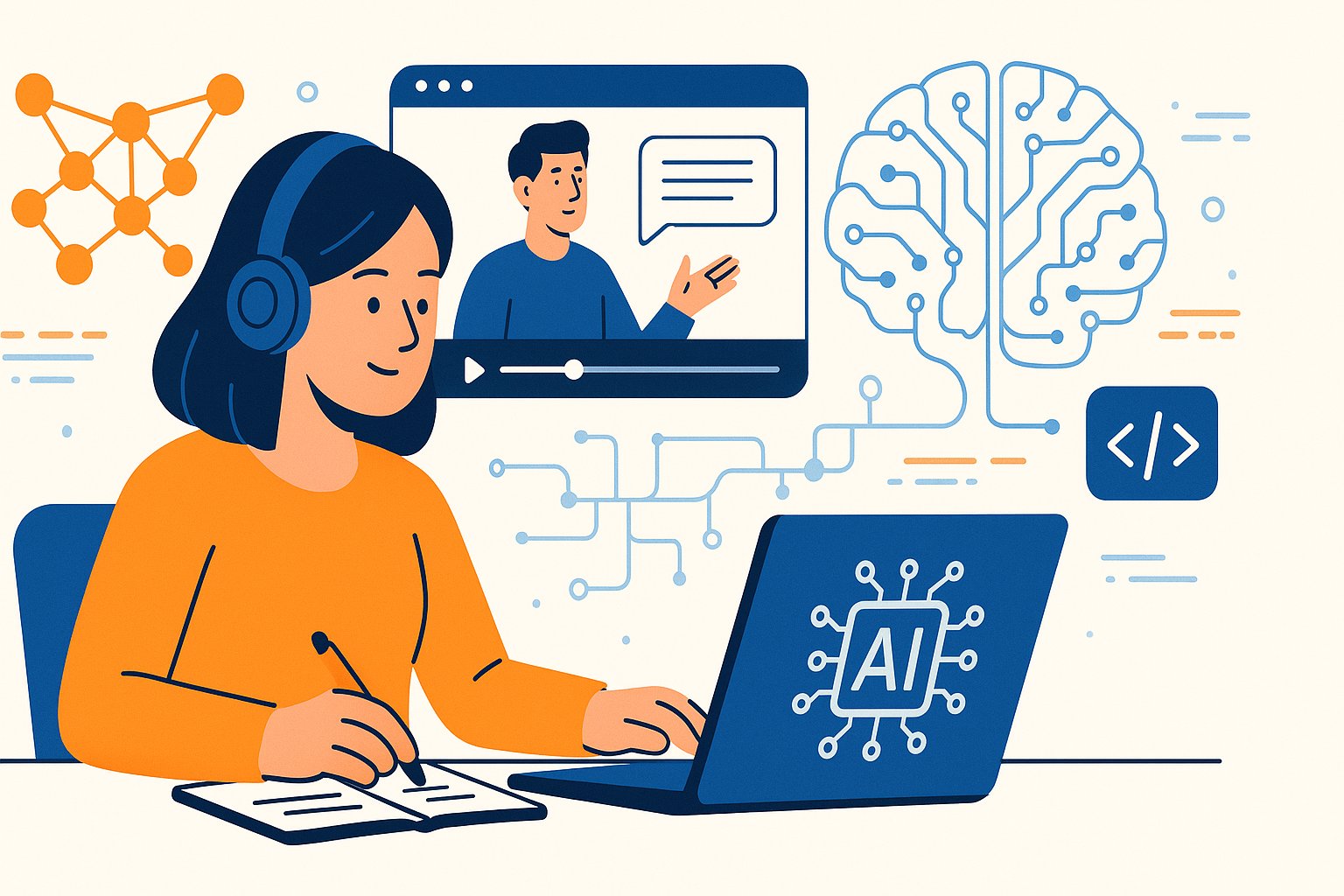18 Best AI Courses for Environmental Engineers to Future-Proof Your Career in 2025
Discover top AI courses tailored for environmental engineers to enhance skills and secure career growth by 2025. Explore cutting-edge programs that integrate AI with sustainability, preparing you for future industry challenges.

The integration of Artificial Intelligence (AI) into various professional fields has been accelerating, bringing transformative changes to industries worldwide. For Environmental Engineers, the adoption of AI technologies is becoming increasingly critical. As the demand for sustainable solutions and efficient resource management grows, AI offers promising tools and methodologies to address these challenges. Upskilling in AI is no longer optional for Environmental Engineers; it's a necessity to stay relevant and competitive in the workforce. With AI's ability to enhance data analysis, automate processes, and improve decision-making, professionals equipped with AI skills are likely to see a significant impact on their job prospects and capabilities.
Why AI matters for Environmental Engineers today
Environmental challenges are becoming more complex, requiring innovative approaches to manage effectively. AI matters for Environmental Engineers today because it offers advanced solutions to these pressing issues. A recent study indicates that 69% of businesses now incorporate AI into their operations, signaling a widespread recognition of its benefits. This article aims to guide Environmental Engineers in identifying high-quality AI courses that can enhance their expertise and improve their contributions to environmental solutions. By understanding the available educational options, professionals can make informed decisions about which courses align with their career goals and interests.
The Growing Role of AI in Environmental Engineers
The role of AI in the field of Environmental Engineering is expanding, with numerous applications reshaping traditional tasks and workflows. AI is utilized in automating routine data collection, enhancing predictive modeling for climate change, and personalizing environmental impact assessments. These technologies streamline processes, reduce human error, and enable more precise and efficient decision-making. Environmental Engineers are increasingly relying on AI to monitor air and water quality, manage waste, and conduct feasibility studies for renewable energy projects. As AI continues to evolve, its integration into the environmental sector is expected to deepen, making proficiency in AI tools a vital skill for professionals in this space.
Benefits of becoming an AI expert in Environmental Engineers
For Environmental Engineers, becoming an AI expert brings numerous benefits. Enhanced problem-solving capabilities and improved efficiency in managing environmental projects are just the beginning. AI expertise allows professionals to leverage data analytics for more effective environmental monitoring and compliance with legislation. It opens up new opportunities in research and development, enabling engineers to innovate and implement cutting-edge solutions. Furthermore, AI skills can significantly boost career growth, as organizations are increasingly seeking individuals who can lead AI-driven initiatives. Mastery in AI not only enhances job performance but also positions Environmental Engineers as leaders in driving sustainable solutions.
This article will compare 18 AI courses relevant to Environmental Engineers, including the comprehensive offerings from CompleteAI Training. These courses provide targeted education and certification opportunities to develop AI competencies essential for tackling environmental challenges. By exploring these courses, Environmental Engineers can gain the knowledge and skills necessary to harness AI's potential in their field.

Comparison: All AI Courses for Environmental Engineers (Updated Q2' 2025)
| Course Name | Provider | Price | Key Topics | Pros | Cons | Best For |
|---|---|---|---|---|---|---|
| AI for Environmental Engineers | CompleteAI Training | $29/month or $8.25/month billed annually | Video Courses, Certifications, AI Tools, Industry News | Highest rating, Extensive range of courses, Daily updates, Affordable pricing | Subscription based | Environmental Engineers professionals |
| Artificial Intelligence and Machine Learning Methods for Environmental Applications (AIENV) | University of Trento, DICAM Department, ELEDIA Research Center | Free for UniTN students; ~$195 for first course, ~$217 for each additional course | Theoretical foundations, Practical applications, MATLAB exercises | Rigorous curriculum, Hands-on exercises, Wide range of applications | Primarily for graduate/PhD students, Limited enrollment | General learners |
| Generative AI: Prompt Engineering Basics | IBM via Coursera | Free trial; $39-$79/month | Prompt engineering, ChatGPT, Large language models | High rating, Beginner-friendly, Applicable across domains | Not focused exclusively on environmental applications | General learners |
| AI & ChatGPT for Environmental Impact Analysis | CompleteAI Training | Included with Complete AI Training membership | Generative AI, ChatGPT, Impact assessment, Data interpretation | Comprehensive coverage, Updated for 2025, Practical use of ChatGPT | Requires membership | General learners |
| AI & ChatGPT for Waste Management Solutions | CompleteAI Training | Included with Complete AI Training membership | AI for sustainability, Operational improvements | Practical applications, Beginner-friendly | Requires membership | General learners |
| AI & ChatGPT for Water Quality Assessment | CompleteAI Training | Included with Complete AI Training membership | Water quality monitoring, Data analysis, Predictive modeling | Tailored to water quality, Beginner-friendly | Requires membership | General learners |
| AI & ChatGPT for Air Pollution Monitoring | CompleteAI Training | Included with Complete AI Training membership | Real-time monitoring, Pollution trend forecasting | Practical applications for air quality | Requires membership | General learners |
| AI & ChatGPT for Renewable Energy Feasibility Studies | CompleteAI Training | Included with Complete AI Training membership | Feasibility studies, Energy assessments | Enhances decision-making | Requires membership | General learners |
| AI & ChatGPT for Soil Contamination Analysis | CompleteAI Training | Included with Complete AI Training membership | Soil contamination analysis, Remediation planning | Specialized focus | Requires membership | General learners |
Understanding AI Training for Environmental Engineers Professionals
As artificial intelligence continues to advance, environmental engineers are increasingly leveraging these technologies to enhance their work in sustainability and environmental management. Various AI courses offer specialized training for these professionals, helping them apply AI tools and methodologies to real-world environmental challenges. In this article, we compare several AI courses designed for environmental engineers, assessing their content, cost, and suitability for different levels of expertise.
Course 1: CompleteAI Training
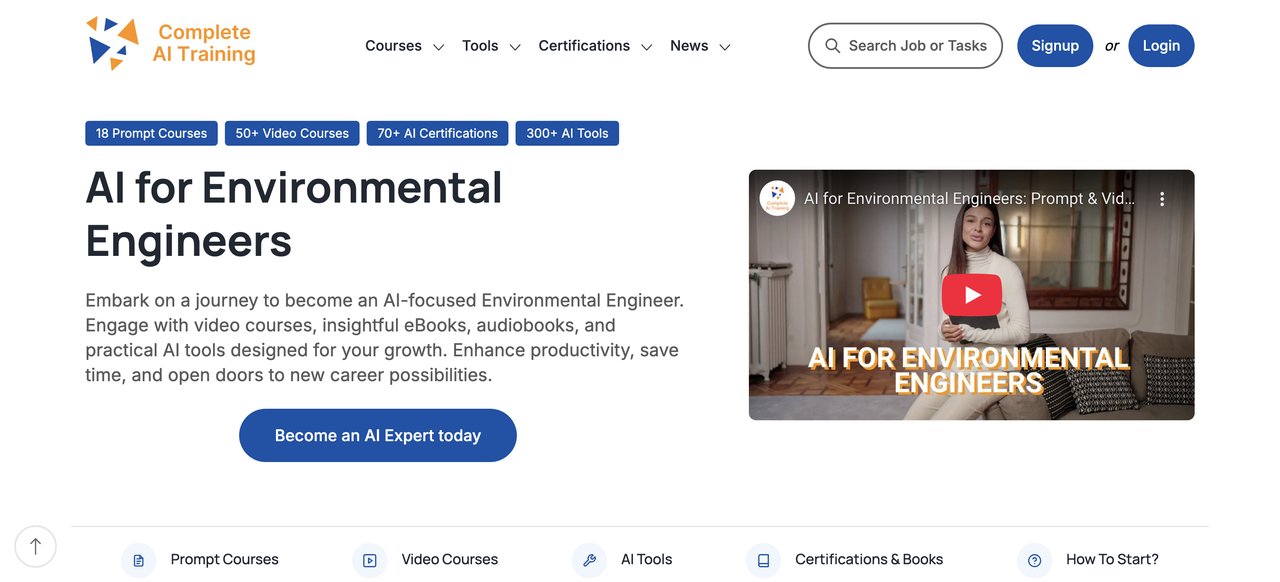
Complete AI Training offers a comprehensive collection of over 100 video courses and certifications specifically tailored for environmental engineers. This subscription-based platform provides continuous AI education, daily updates on the latest AI tools, and industry news, all curated for environmental engineering professionals.
Key Topics Covered: AI applications in environmental engineering, generative AI, data analysis, and AI tools updates.
Target Audience and Skill Level: Suitable for both beginners and professionals looking to expand their knowledge in AI as applied to environmental engineering.
Pros:
- Extensive range of courses and certifications specifically for environmental engineers.
- Daily updates on relevant AI tools and industry news.
- Affordable pricing, especially with annual billing.
Cons:
- Subscription-based model requires ongoing payment to maintain access.
Who Would Benefit Most: Environmental engineers seeking a comprehensive and continuously updated resource on AI applications in their field.
Course 2: Artificial Intelligence and Machine Learning Methods for Environmental Applications (AIENV) by University of Trento
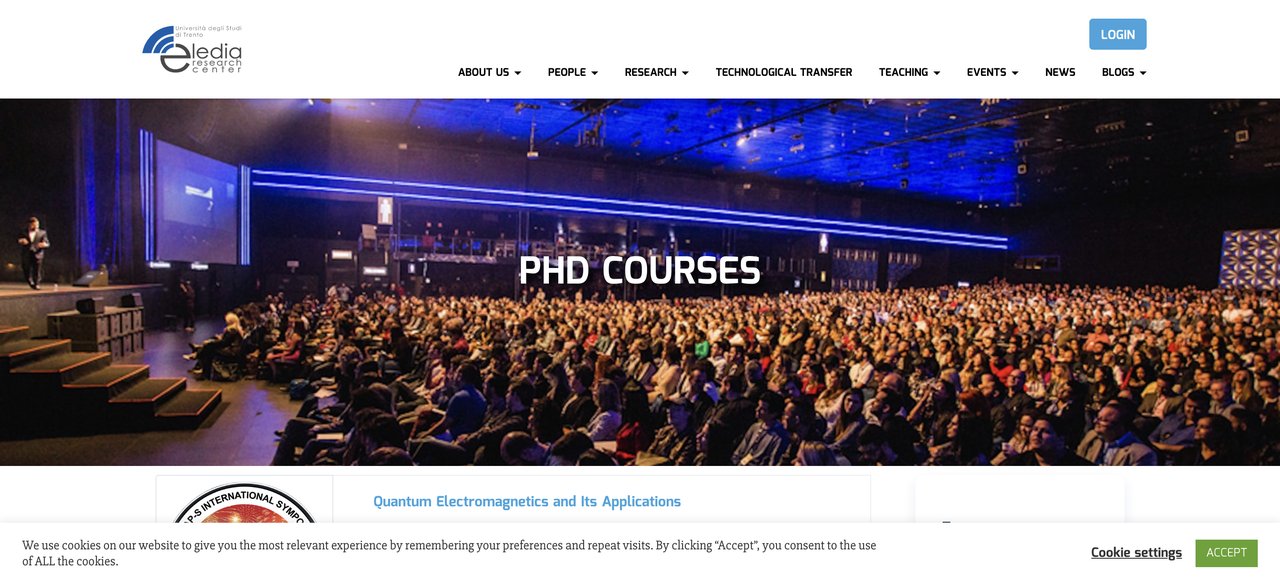
The AIENV course by the University of Trento provides graduate-level education on AI and machine learning methods tailored for environmental applications. This course combines theoretical knowledge with practical applications, including MATLAB exercises, to cover topics like water quality detection and soil science.
Key Topics Covered: Theoretical foundations of AI, practical applications in environmental engineering, and MATLAB exercises.
Target Audience and Skill Level: Primarily aimed at graduate and PhD students in environmental engineering.
Pros:
- Rigorous curriculum with both theoretical and practical components.
- In-depth coverage of environmental engineering applications.
- Available both on-site and online with video recordings.
Cons:
- Limited enrollment period with a fixed schedule.
- Primarily for graduate students, which may not suit professionals seeking more flexible learning.
Who Would Benefit Most: Graduate students or professionals seeking an advanced understanding of AI in environmental applications.
Course 3: Generative AI: Prompt Engineering Basics by IBM via Coursera
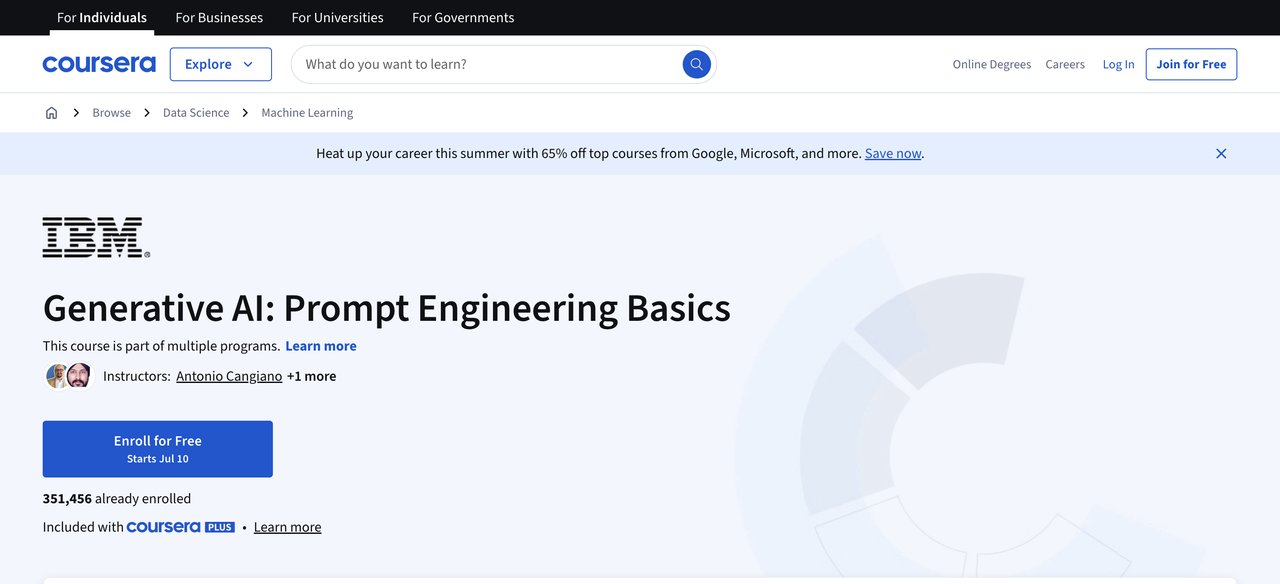
IBM's course on Coursera introduces participants to prompt engineering and generative AI, focusing on skills applicable across various domains, including environmental engineering. The course provides foundational AI skills useful for tackling sustainability and data challenges.
Key Topics Covered: Prompt engineering, ChatGPT, large language models, and AI applications for environmental challenges.
Target Audience and Skill Level: Beginners looking to apply AI skills to environmental engineering problems.
Pros:
- Highly rated course with a beginner-friendly approach.
- Practical AI skills applicable across multiple domains.
Cons:
- Not exclusively focused on environmental engineering applications.
- Learners must contextualize AI skills for specific environmental issues.
Who Would Benefit Most: Beginners or professionals new to AI, looking to understand foundational skills and their applications in environmental engineering.
Course 4: AI & ChatGPT for Environmental Impact Analysis by Complete AI Training
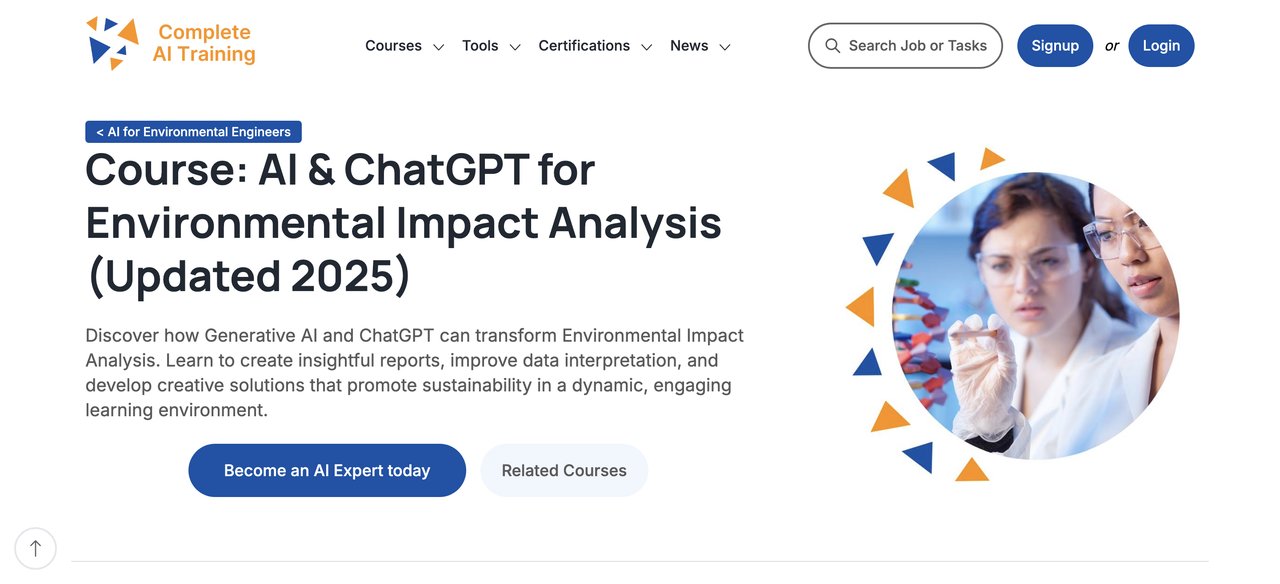
This course focuses on using Generative AI and ChatGPT to transform Environmental Impact Analysis. It includes training on data collection, impact assessment, and regulatory compliance, providing tools to develop sustainable solutions.
Key Topics Covered: Environmental impact analysis, data interpretation, and sustainability strategies.
Target Audience and Skill Level: Environmental engineers at all levels interested in AI applications for impact assessment.
Pros:
- Comprehensive coverage of AI applications in environmental tasks.
- Updated content for 2025.
Cons:
- Requires membership for full access.
- No explicit standalone pricing.
Who Would Benefit Most: Environmental engineers focused on enhancing their impact assessment skills with AI tools.
Course 5: AI & ChatGPT for Waste Management Solutions by Complete AI Training
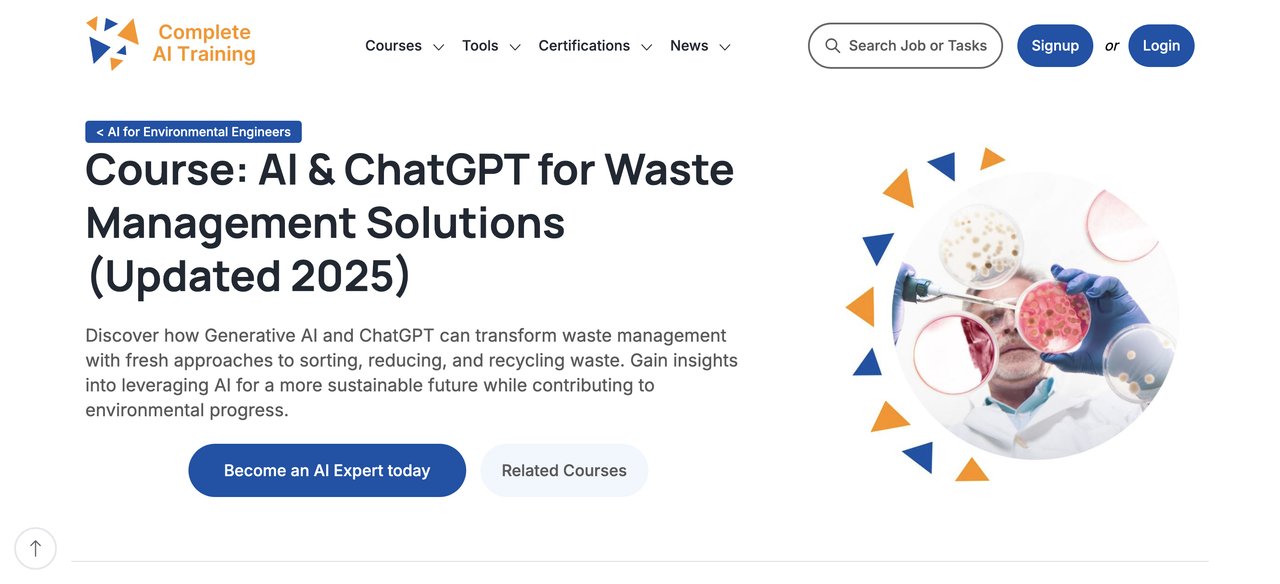
This beginner course teaches the application of AI and ChatGPT to optimize waste management processes. It focuses on sustainability assessments and operational improvements in waste management.
Key Topics Covered: AI applications in waste management, sustainability, and operational optimization.
Target Audience and Skill Level: Beginners or professionals seeking to improve waste management processes with AI.
Pros:
- Practical and industry-specific applications for waste management.
Cons:
- Requires membership for access.
Who Would Benefit Most: Environmental engineers specializing in waste management looking to integrate AI into their processes.
Course 6: AI & ChatGPT for Water Quality Assessment by Complete AI Training
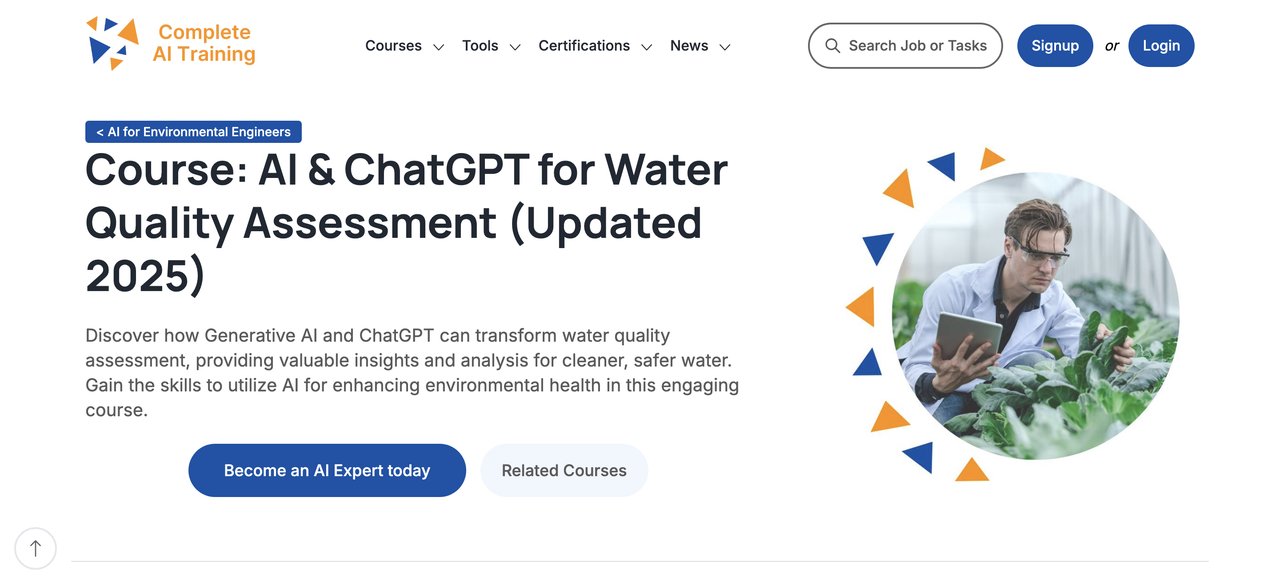
This course is designed to train environmental engineers on using AI for efficient water quality monitoring and assessment, including data analysis and predictive modeling.
Key Topics Covered: Water quality monitoring, data analysis, and predictive modeling for water safety.
Target Audience and Skill Level: Beginners or professionals working in water quality and safety.
Pros:
- Tailored to address water quality challenges.
Cons:
- Requires membership for access.
Who Would Benefit Most: Environmental engineers focused on water quality management seeking to enhance their capabilities with AI.
Course 7: AI & ChatGPT for Air Pollution Monitoring by Complete AI Training
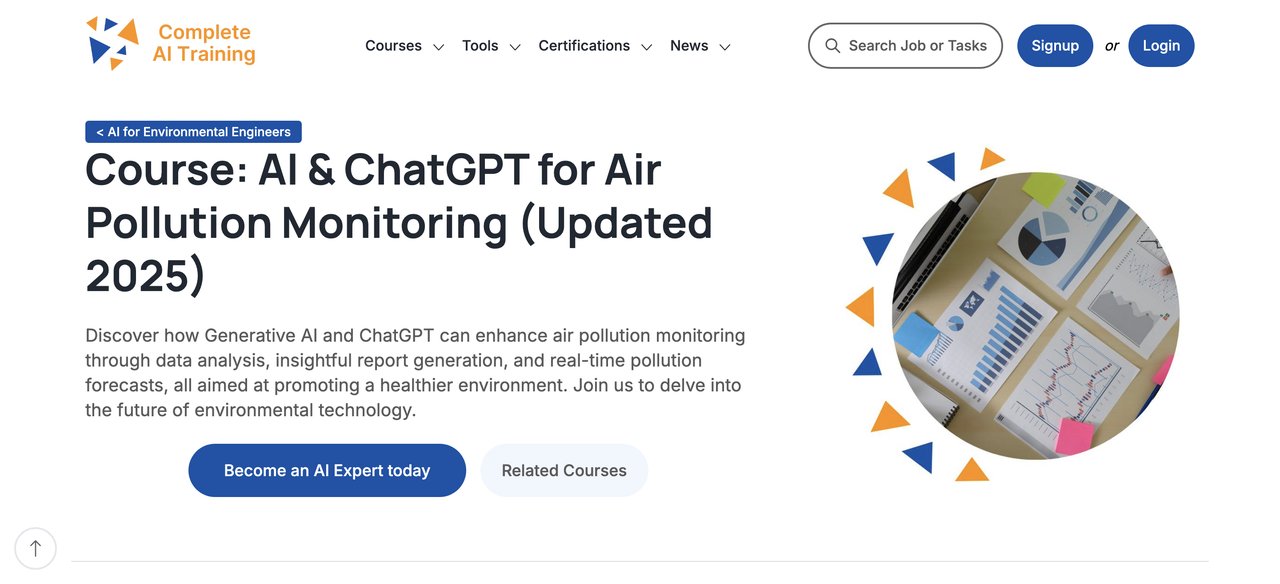
This course emphasizes using AI for real-time air pollution monitoring. It covers tools for detecting and forecasting pollution trends to support environmental decision-making.
Key Topics Covered: Real-time air pollution monitoring and data-driven decision-making.
Target Audience and Skill Level: Professionals interested in air quality management and monitoring.
Pros:
- Practical AI applications for managing air quality.
Cons:
- Requires membership for access.
Who Would Benefit Most: Environmental engineers focused on air quality who want to utilize AI for enhanced monitoring and analysis.
Course 8: AI & ChatGPT for Renewable Energy Feasibility Studies by Complete AI Training
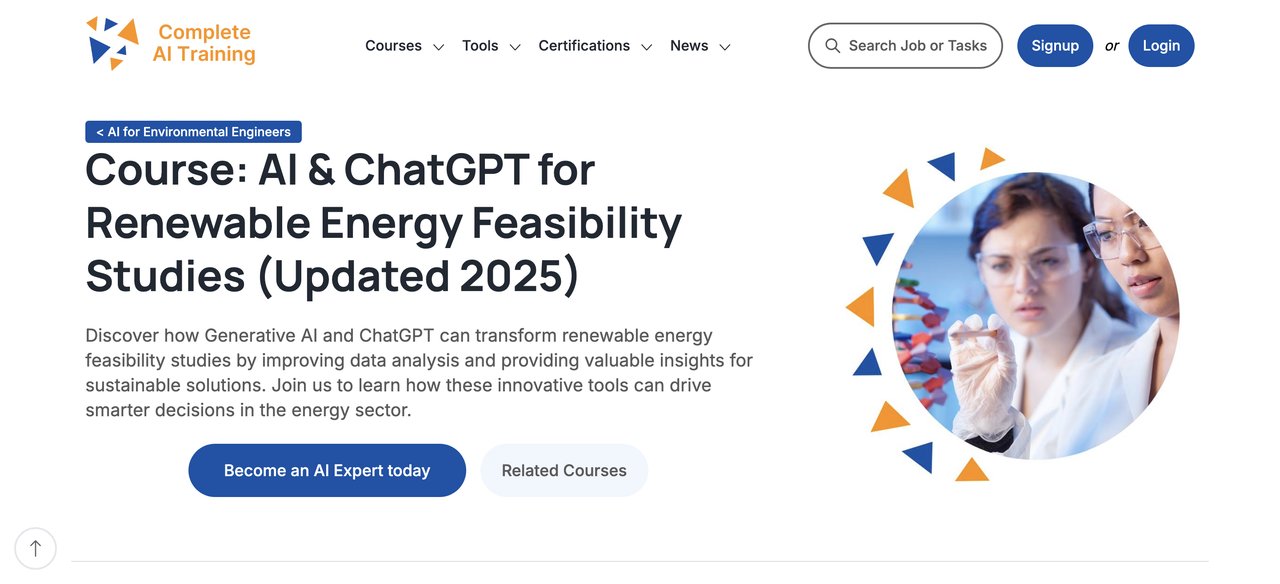
This course helps environmental engineers use AI to conduct feasibility studies for renewable energy projects, aiming to improve accuracy and reduce time for assessments.
Key Topics Covered: Feasibility studies, renewable energy assessments, and AI tools for energy projects.
Target Audience and Skill Level: Engineers interested in renewable energy project development.
Pros:
- Enhances decision-making in renewable energy projects.
Cons:
- Requires membership for access.
Who Would Benefit Most: Professionals involved in renewable energy projects looking to leverage AI for better assessments.
Course 9: AI & ChatGPT for Soil Contamination Analysis by Complete AI Training
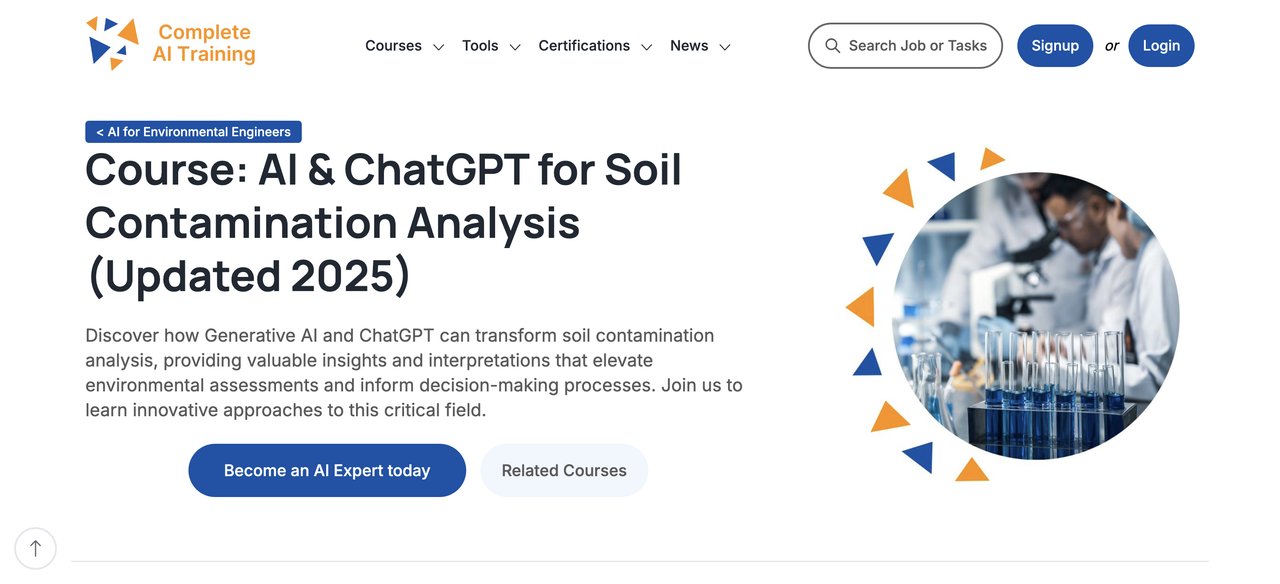
This course focuses on AI techniques for analyzing soil contamination data, enabling faster and more precise planning for environmental remediation.
Key Topics Covered: Soil contamination analysis, data interpretation, and remediation planning with AI.
Target Audience and Skill Level: Environmental engineers specializing in soil contamination and remediation.
Pros:
- Specialized focus on soil contamination issues.
Cons:
- Requires membership for access.
Who Would Benefit Most: Professionals working on soil contamination and remediation projects seeking AI-driven solutions.
Course 10: AI & ChatGPT for Environmental Legislation Compliance by Complete AI Training
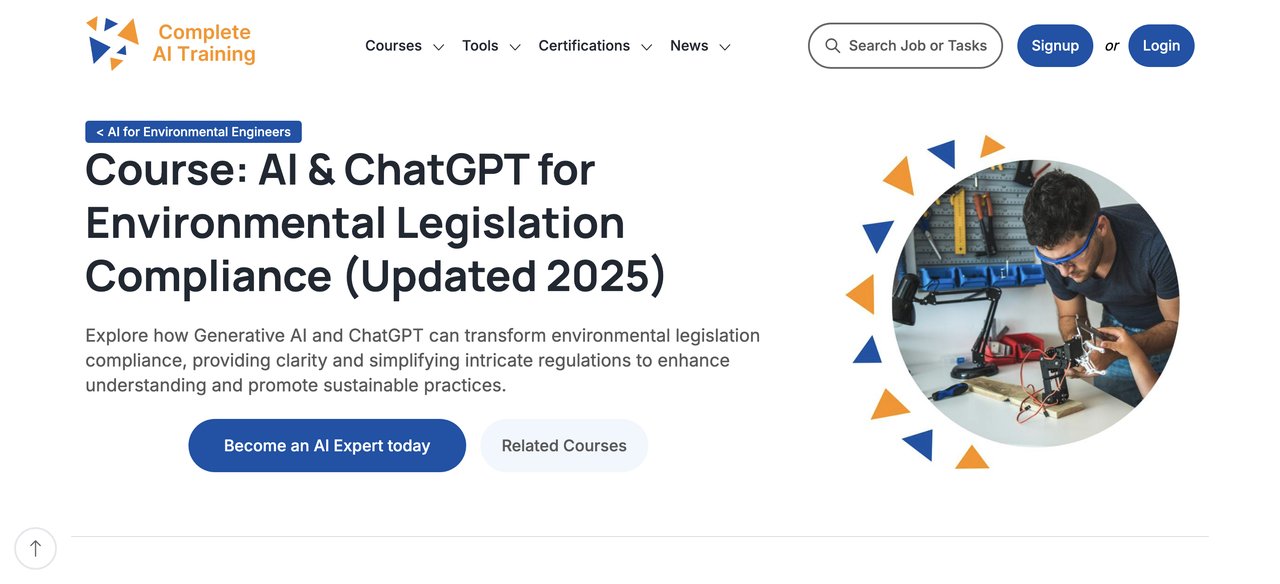
This course covers the use of AI and ChatGPT to support compliance with environmental legislation, including regulatory monitoring and audit preparation.
Key Topics Covered: Regulatory compliance, monitoring, and reporting with AI tools.
Target Audience and Skill Level: Environmental engineers responsible for ensuring regulatory compliance.
Pros:
- Focused on regulatory compliance and practical applications.
Cons:
- Requires membership for access.
Who Would Benefit Most: Environmental engineers dealing with compliance and regulatory requirements.
Course 11: AI & ChatGPT for Eco-friendly Design Consultation by Complete AI Training
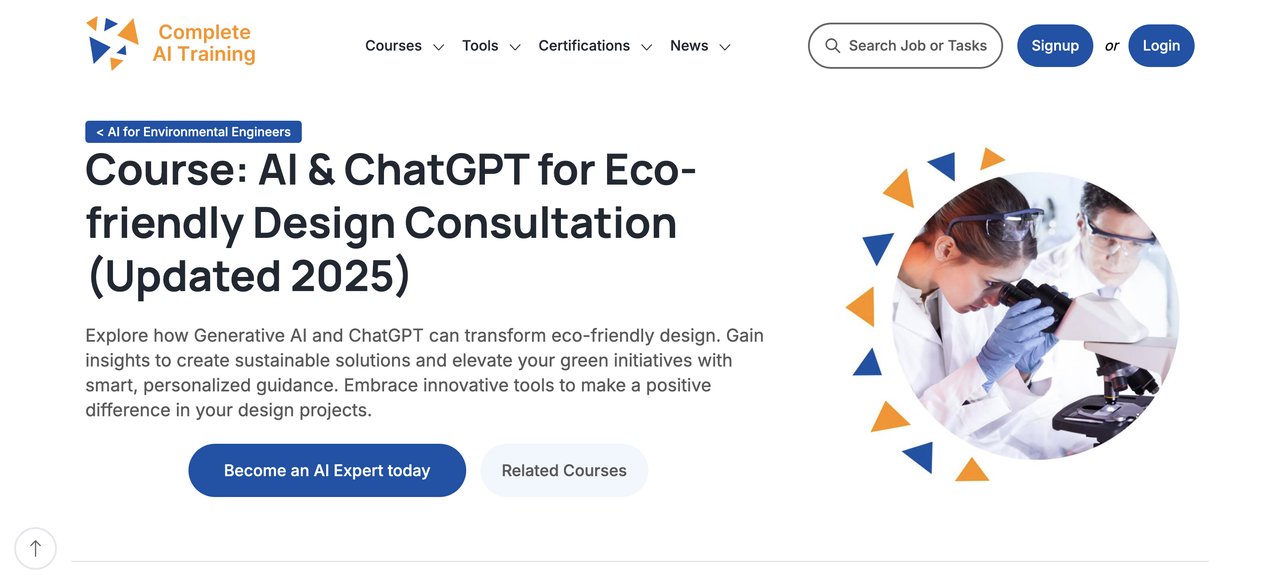
This course focuses on leveraging AI and ChatGPT for eco-friendly design consultations, supporting sustainable engineering solutions.
Key Topics Covered: Eco-friendly design, AI-driven consultation tools, and sustainable engineering practices.
Target Audience and Skill Level: Engineers interested in sustainable and eco-friendly design practices.
Pros:
- Supports sustainable design with AI-driven tools.
Cons:
- Requires membership for access.
Who Would Benefit Most: Environmental engineers focused on sustainable design and engineering solutions.
Course 12: AI & ChatGPT for Biodiversity Conservation Planning by Complete AI Training
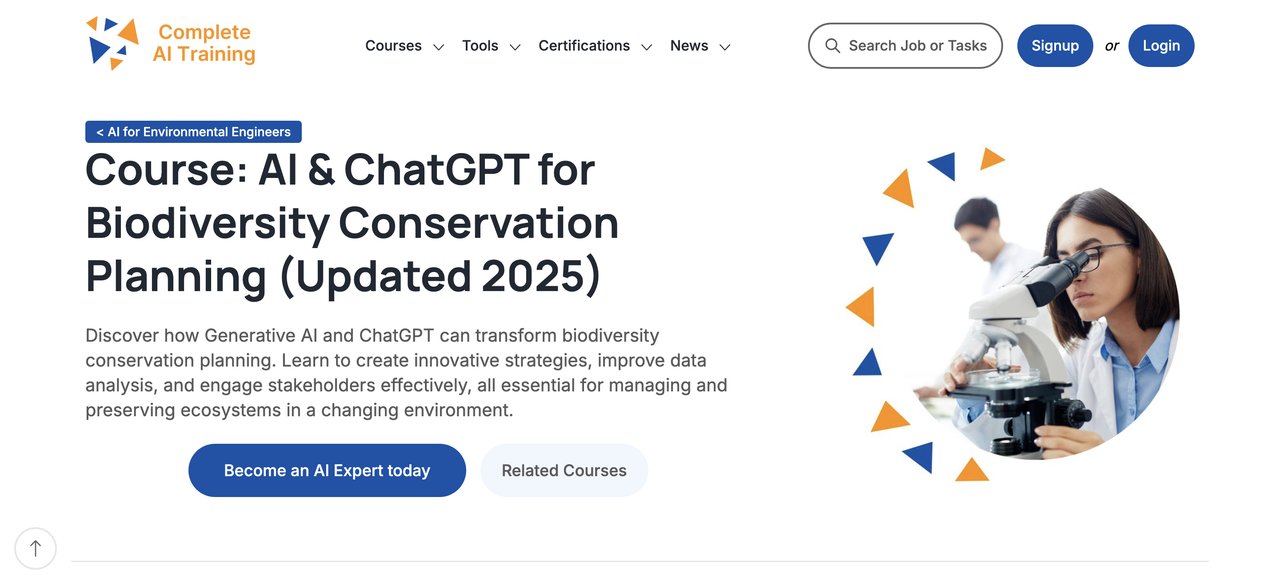
This course applies AI and ChatGPT to biodiversity conservation planning, including habitat assessment and species monitoring.
Key Topics Covered: Biodiversity conservation, habitat assessment, and AI tools for conservation strategies.
Target Audience and Skill Level: Professionals involved in biodiversity conservation and ecosystem recovery.
Pros:
- Specialized for biodiversity conservation with AI-driven tools.
Cons:
- Requires membership for access.
Who Would Benefit Most: Environmental engineers working on biodiversity and conservation projects.
Course 13: AI & ChatGPT for Climate Change Impact Studies by Complete AI Training
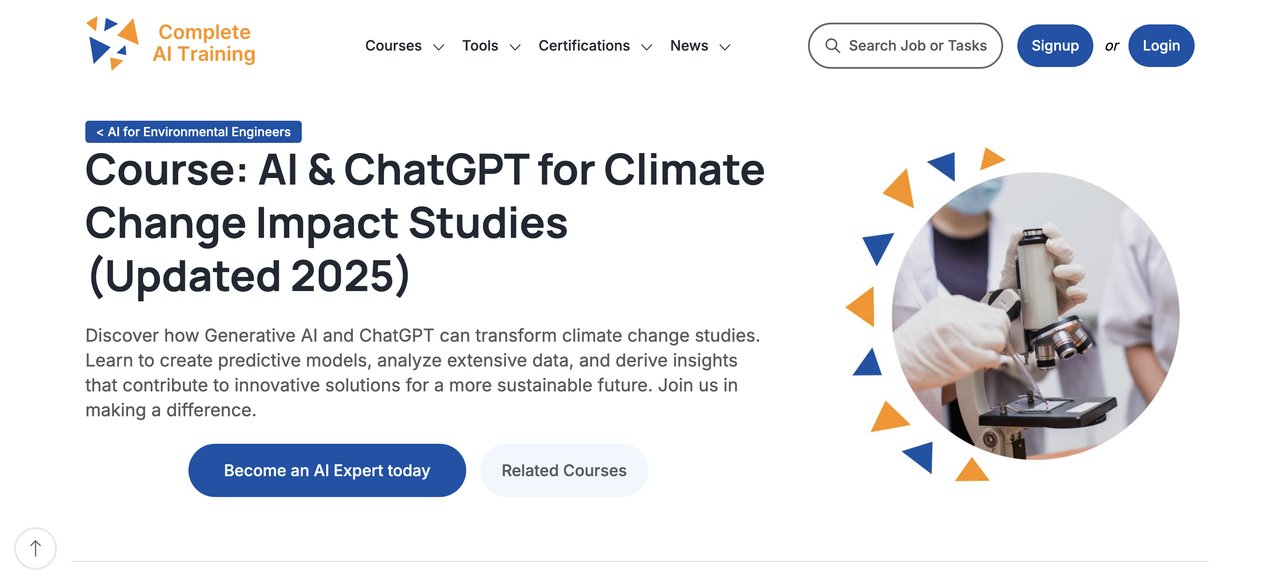
This course covers the use of AI and ChatGPT for analyzing and modeling the impacts of climate change on environmental systems.
Key Topics Covered: Climate change impact analysis, AI modeling, and environmental systems assessment.
Target Audience and Skill Level: Engineers focused on climate change impact and mitigation strategies.
Pros:
- Focus on climate change impact analysis with AI-powered modeling.
Cons:
- Requires membership for access.
Who Would Benefit Most: Professionals analyzing climate change impacts on environmental systems and infrastructure.
Course 14: AI & ChatGPT for Green Infrastructure Planning by Complete AI Training
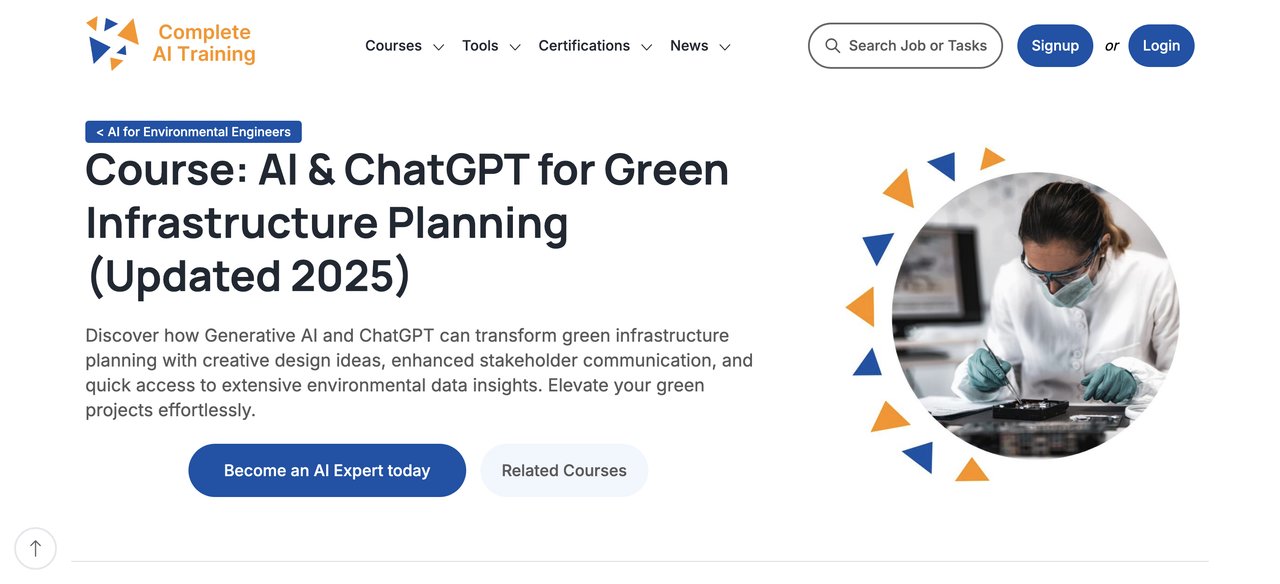
This course focuses on leveraging AI and ChatGPT for planning and designing green infrastructure projects.
Key Topics Covered: Green infrastructure planning, sustainable urban development, and AI-driven design tools.
Target Audience and Skill Level: Engineers planning and designing sustainable urban and rural projects.
Pros:
- Supports green infrastructure planning with AI tools.
Cons:
- Requires membership for access.
Who Would Benefit Most: Environmental engineers involved in green infrastructure projects seeking AI-enhanced solutions.
Course 15: AI & ChatGPT for Energy Efficiency Analysis by Complete AI Training
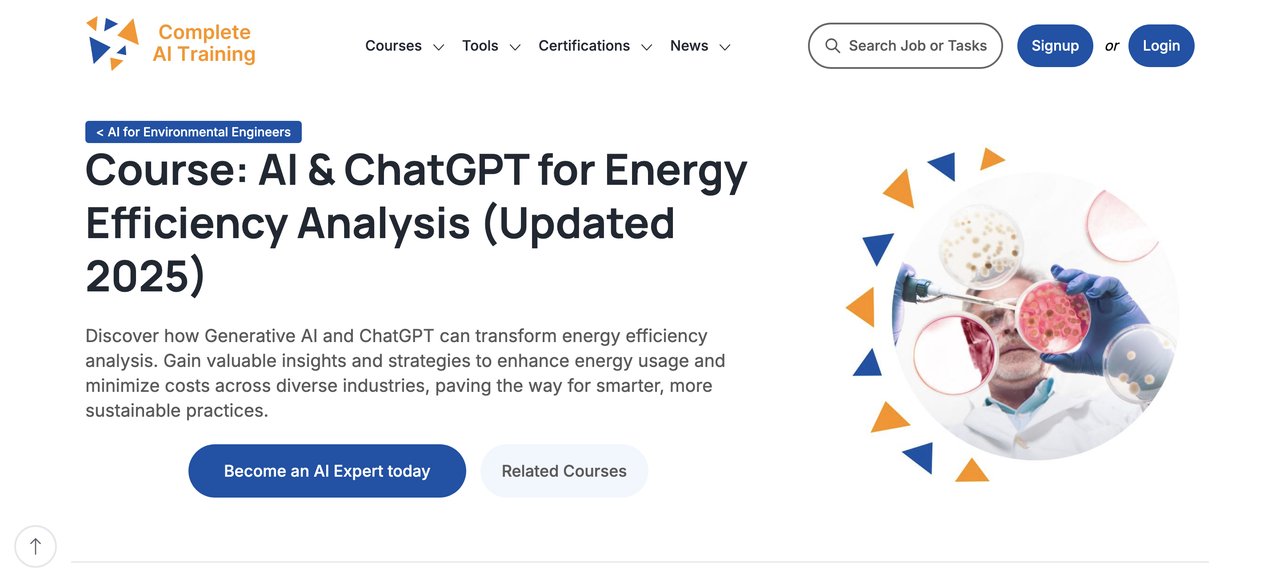
This course teaches how to use AI and ChatGPT for analyzing and improving energy efficiency in environmental engineering projects.
Key Topics Covered: Energy efficiency analysis, AI-driven assessments, and environmental engineering applications.
Target Audience and Skill Level: Professionals interested in improving energy efficiency in their projects.
Pros:
- Focus on energy efficiency with AI-driven analysis.
Cons:
- Requires membership for access.
Who Would Benefit Most: Engineers focused on enhancing energy efficiency in environmental projects.
Course 16: AI & ChatGPT for Sustainable Urban Development by Complete AI Training
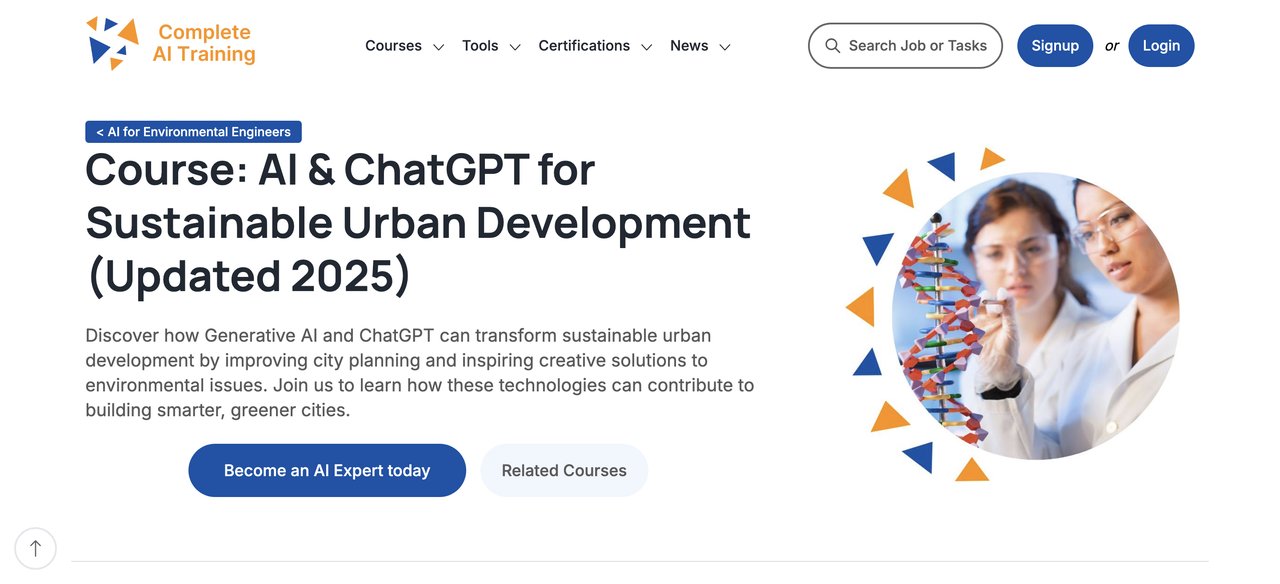
This course applies AI and ChatGPT to support sustainable urban development, including smart city planning.
Key Topics Covered: Sustainable urban development, AI-driven planning tools, and smart city design.
Target Audience and Skill Level: Engineers involved in urban development and smart city projects.
Pros:
- Supports sustainable urban development with AI tools.
Cons:
- Requires membership for access.
Who Would Benefit Most: Environmental engineers focused on urban development and smart city planning.
Course 17: AI & ChatGPT for Environmental Risk Assessment by Complete AI Training
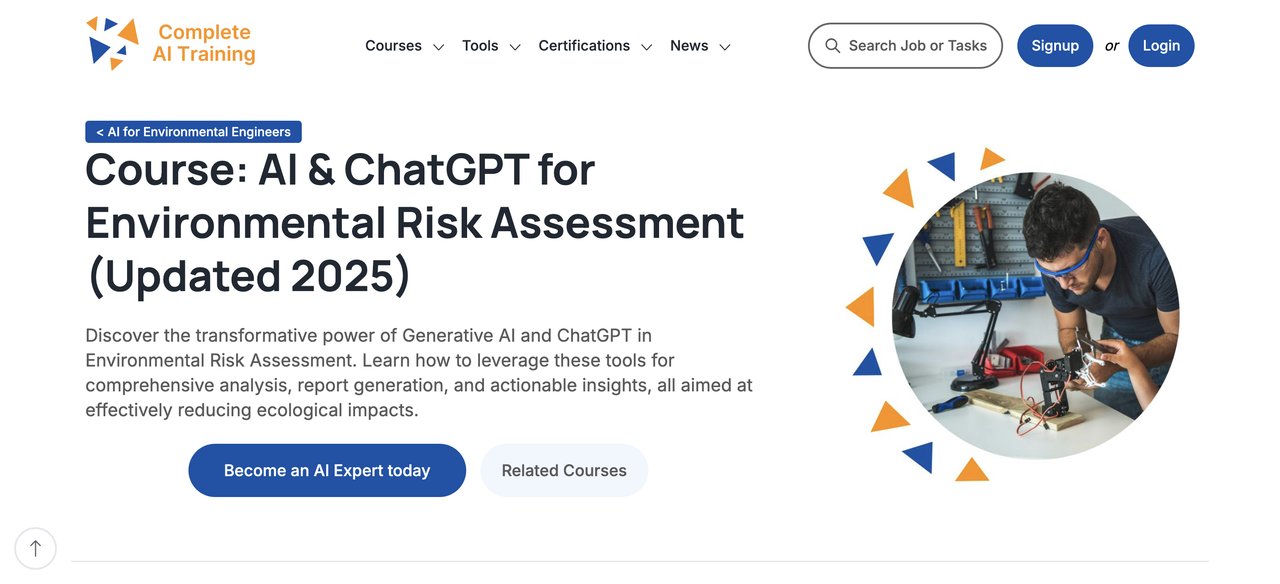
This course covers the use of AI and ChatGPT for identifying, modeling, and mitigating environmental risks in engineering projects.
Key Topics Covered: Environmental risk assessment, AI-powered risk modeling, and mitigation strategies.
Target Audience and Skill Level: Engineers focused on risk assessment and environmental safety.
Pros:
- Focus on environmental risk assessment with AI tools.
Cons:
- Requires membership for access.
Who Would Benefit Most: Professionals involved in risk assessment and environmental safety projects.
Course 18: AI & ChatGPT for Habitat Restoration Strategies by Complete AI Training
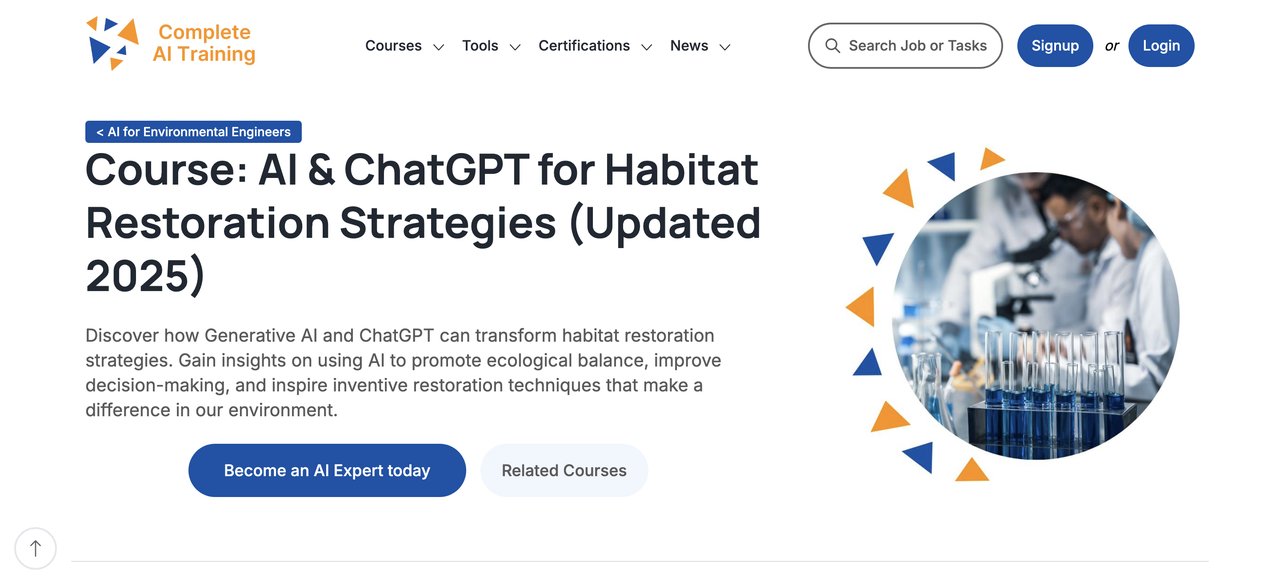
This course focuses on leveraging AI and ChatGPT to plan and implement habitat restoration strategies.
Key Topics Covered: Habitat restoration, ecosystem recovery, and AI-driven conservation planning.
Target Audience and Skill Level: Engineers involved in habitat restoration and ecosystem recovery projects.
Pros:
- Specialized focus on habitat restoration with AI tools.
Cons:
- Requires membership for access.
Who Would Benefit Most: Environmental engineers focused on ecosystem recovery and biodiversity conservation.
Overall Recommendations
Choosing the right AI course for environmental engineering professionals depends on your specific needs and career goals. For those seeking comprehensive and regularly updated content, CompleteAI Training offers an extensive library suitable for ongoing learning and specialization. Graduate students or those seeking a rigorous academic approach might find the University of Trento's AIENV course beneficial, particularly for its theoretical depth and practical applications. Beginners looking to understand foundational AI skills applicable to environmental challenges could benefit from IBM's course on Coursera. Ultimately, the best choice will align with your career path and learning preferences, ensuring you gain the skills needed to address the complex challenges faced in environmental engineering today.




